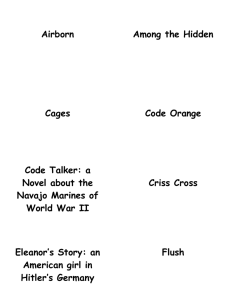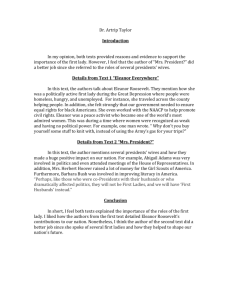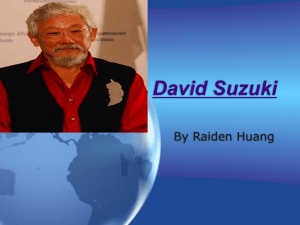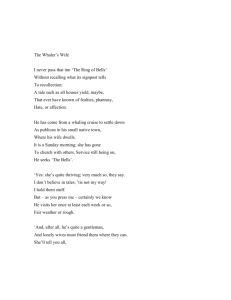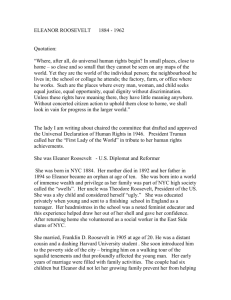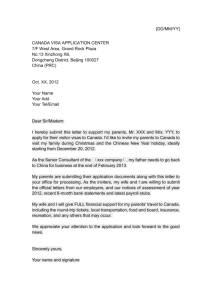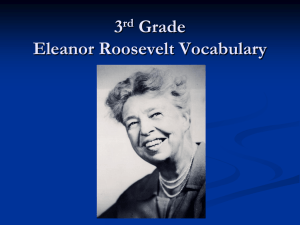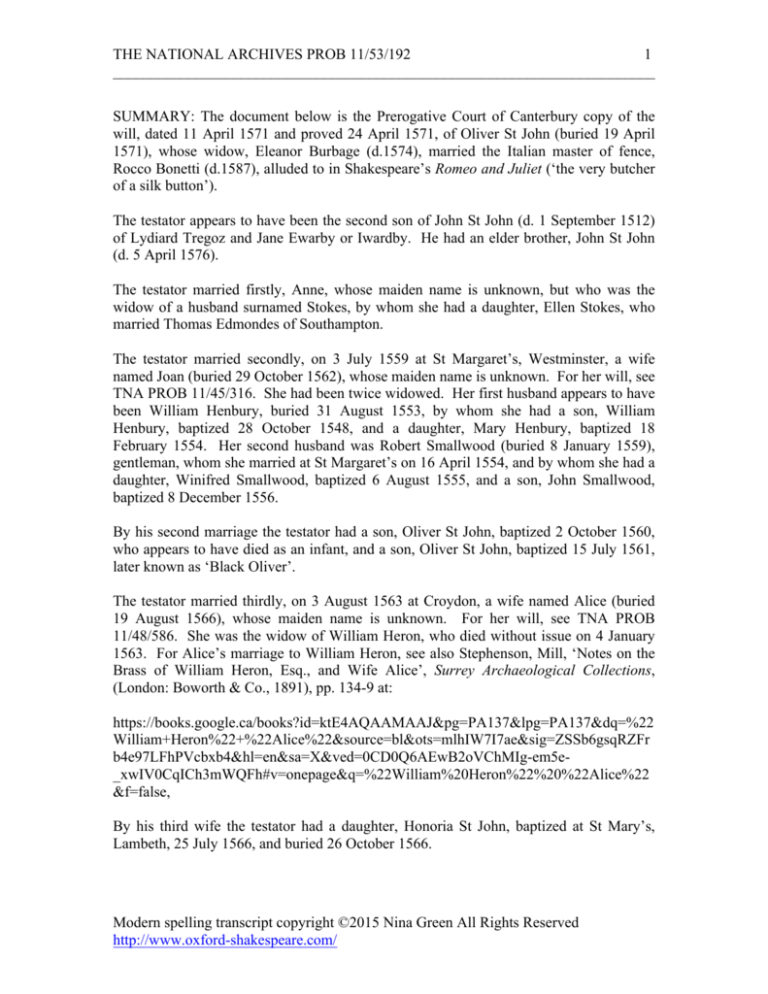
THE NATIONAL ARCHIVES PROB 11/53/192
1
________________________________________________________________________
SUMMARY: The document below is the Prerogative Court of Canterbury copy of the
will, dated 11 April 1571 and proved 24 April 1571, of Oliver St John (buried 19 April
1571), whose widow, Eleanor Burbage (d.1574), married the Italian master of fence,
Rocco Bonetti (d.1587), alluded to in Shakespeare’s Romeo and Juliet (‘the very butcher
of a silk button’).
The testator appears to have been the second son of John St John (d. 1 September 1512)
of Lydiard Tregoz and Jane Ewarby or Iwardby. He had an elder brother, John St John
(d. 5 April 1576).
The testator married firstly, Anne, whose maiden name is unknown, but who was the
widow of a husband surnamed Stokes, by whom she had a daughter, Ellen Stokes, who
married Thomas Edmondes of Southampton.
The testator married secondly, on 3 July 1559 at St Margaret’s, Westminster, a wife
named Joan (buried 29 October 1562), whose maiden name is unknown. For her will, see
TNA PROB 11/45/316. She had been twice widowed. Her first husband appears to have
been William Henbury, buried 31 August 1553, by whom she had a son, William
Henbury, baptized 28 October 1548, and a daughter, Mary Henbury, baptized 18
February 1554. Her second husband was Robert Smallwood (buried 8 January 1559),
gentleman, whom she married at St Margaret’s on 16 April 1554, and by whom she had a
daughter, Winifred Smallwood, baptized 6 August 1555, and a son, John Smallwood,
baptized 8 December 1556.
By his second marriage the testator had a son, Oliver St John, baptized 2 October 1560,
who appears to have died as an infant, and a son, Oliver St John, baptized 15 July 1561,
later known as ‘Black Oliver’.
The testator married thirdly, on 3 August 1563 at Croydon, a wife named Alice (buried
19 August 1566), whose maiden name is unknown. For her will, see TNA PROB
11/48/586. She was the widow of William Heron, who died without issue on 4 January
1563. For Alice’s marriage to William Heron, see also Stephenson, Mill, ‘Notes on the
Brass of William Heron, Esq., and Wife Alice’, Surrey Archaeological Collections,
(London: Boworth & Co., 1891), pp. 134-9 at:
https://books.google.ca/books?id=ktE4AQAAMAAJ&pg=PA137&lpg=PA137&dq=%22
William+Heron%22+%22Alice%22&source=bl&ots=mlhIW7I7ae&sig=ZSSb6gsqRZFr
b4e97LFhPVcbxb4&hl=en&sa=X&ved=0CD0Q6AEwB2oVChMIg-em5e_xwIV0CqICh3mWQFh#v=onepage&q=%22William%20Heron%22%20%22Alice%22
&f=false,
By his third wife the testator had a daughter, Honoria St John, baptized at St Mary’s,
Lambeth, 25 July 1566, and buried 26 October 1566.
Modern spelling transcript copyright ©2015 Nina Green All Rights Reserved
http://www.oxford-shakespeare.com/
THE NATIONAL ARCHIVES PROB 11/53/192
2
________________________________________________________________________
The testator married fourthly, at St Bartholomew the Less on 10 July 1567, Eleanor
Burbage (d.1574). According to the pedigree in Cass, infra, she was the daughter of
Thomas Burbage (d.1560) of Hayes, Middlesex, by Anne Muncaster, the daughter of
James Muncaster (d.1507), Merchant Tailor of London, and his wife, Mary (d.1508). For
the wills of James and Mary Muncaster see TNA PROB 11/15/568 and TNA PROB
11/16/24. When she married the testator, Eleanor Burbage had been twice widowed. She
married firstly, at St Margaret’s, Westminster on 20 January 1543, her cousin, Henry
Windsor (buried 25 September 1553) of Harting, Sussex, the eldest son and heir of Sir
Anthony Windsor (d.1548), for whose will see TNA PROB 11/32/517; and secondly,
Hugh Partridge, brother of Sir Miles Partridge (executed 26 February 1552), for whom
see the ODNB article. Evans provides the following information concerning the
relationship between the families of Eleanor Burbage and her first husband, Henry
Windsor:
Henry Windsor, who was an idiot from birth, was the elder son of Sir Anthony Windsor,
by his first wife Elizabeth Lovell, of Harting, divorced wife of Sir Edward Bray (V.C.H.
Sussex, IV (1953), 15). Sir Anthony was a younger brother of Andrews, Lord Windsor,
and they were sons of Myles Windsor by Joan Greene; whose step-brother Sir Robert
Greene was father of Cicely Greene, wife of William Burbage. They were the
grandparents of Eleanor Burbage. Henry and Eleanor Windsor disposed of Surrey
property at Ashurst in Witley and Fridinghurst in 1549 (V.C.H. Surrey, III (1911), 12,
85). Henry Windsor must have died s. p., as his sister Constance Rythe was the heir to
Harting (P.R.O., Early Chancery Proceedings, files 1428/35, 1466/74).
As noted above, after the testator’s death, Eleanor Burbage married Rocco Bonetti.
According to letters of denization granted to Bonetti on 6 July 1572, he was from Baresi
near Bergamo. See TNA C 66/1089, mm. 3-4; and Page, William, ed., Letters of
Denization and Acts of Naturalization for Aliens in England, 1509-1603, Publications of
the Huguenot Society of London, Vol. VIII, 1893, p. 26 at:
https://books.google.ca/books?id=HJZAAQAAMAAJ&pg=PR2&lpg=PR2&dq=%22Lett
ers+of+Denization%22&source=bl&ots=w9nhMV892-&sig=AxcEFBOufD04LOm1ycdnXj33Qs&hl=en&sa=X&ved=0CFUQ6AEwDWoVChMIhKrkg
_DFxwIVSSyICh0bowW8#v=onepage&q=%22Letters%20of%20Denization%22&f=fal
se
Bonetto De Baressis, Rochus, of Bergamo (Bargamascensis) Captain within the territory
and dominion of Venice. Born in Italy. 6 July, 1572. (Pat., 14 Eliza. p. 8. m. 4).
On Leicester’s recommendation, Queen Elizabeth granted Bonetti a coat of arms by
letters patent at Kenilworth on 14 August 1568 as Rocho, son of Alvise d’ Bonettis of
Baresi beyond the Goggia in Valle Brembana in the lordship of Bergamo under the rule
of the Republic of Venice. See Siddons, Michael Powell, The Heraldry of Foreigners in
England 1400-1700, (London: Harleian Society, 2010), New Series, Vol. 19, pp. 38-40.
Modern spelling transcript copyright ©2015 Nina Green All Rights Reserved
http://www.oxford-shakespeare.com/
THE NATIONAL ARCHIVES PROB 11/53/192
3
________________________________________________________________________
Details of the testator’s four marriages are taken from Evans, Charles F.H., ‘The Family
of St John of Lambeth’, Surrey Archaeological Collections, 1966, Vol. 63, pp. 151-6,
available online.
For Eleanor Burbage’s marriage to Henry Windsor, see also:
http://discovery.nationalarchives.gov.uk/details/rd/9392826c-095d-4c78-a3738321e3ed8fa0
East Sussex Record Office SAS/G5/21 Memorandum of a settlement of the manor of
Exceat, shown by Mr St John. Parties: William Windsor, knight, Edmund Windsor,
esquire, Robert Burbage and Anthony Burbage, gentlemen, John Ede, yeoman, against
Anthony Windsor, knight, of a moiety of the manor of Exceat (among other manors) to
the use of Henry Windsor and his wife Eleanor, then the wife of Mr St John, in pursuance
of a deed dated 20 June 1542. Undated, but c.1560.
See also the will, TNA PROB 11/57/448, of Eleanor Burbage’s brother, Robert Burbage
(d.1575) of Hayes Park Hall, Middlesex, who sold his manor of Theobalds alias Tongs to
Oxford’s father-in-law, Lord Burghley, who later built his mansion of Theobalds on the
site.
It appears from the Burbage pedigree that Eleanor Burbage had no children by any of her
four husbands, and at her death in 1574, the house and goods in which she had been left a
life estate in the testator’s will below were seized by the testator’s overseer, John
Vavasour, and Eleanor’s brother, Robert Burbage. Rocco Bonetti complained of this to
the Privy Council. See Dasent, John Roche, ed., Acts of the Privy Council of England,
New Series, Vol. IX (London: Her Majesty’s Stationery Office, 1894), p. 41 at:
https://books.google.ca/books?id=Hlc0AQAAMAAJ&pg=PA41&lpg=PA41&dq=%22R
occo%22+%22Burbage%22&source=bl&ots=BsdP1JNKYh&sig=ygXS5vLvZn3pt7Q3
MW4mnLovuB4&hl=en&sa=X&ei=72r_VMyWNI7woATwmoLoDw&ved=0CDsQ6A
EwBg#v=onepage&q=%22Rocco%22%20%22Burbage%22&f=false
Windsor, 1 November 1575. A letter to the Master of the Rolls and Mr Doctor Wilson,
whereas heretofore they have been written unto in the behalf of one Rocco Bonetti, who
complaining that after the death of his wife his house and goods were seised and
possessed by one Robert Burbage and John Vavasour, they, examining the matter, caused
the said Vavasour to compound with the said Rocco, and giving respite to the said
Burbage until some other time, they be required, forasmuch as the said Burbage died
without making him any recompense, and that his goods came to the hands of one Mr
Goring of Sussex who married the daughter of the said Burbage, to call the said Goring
before them and to understand the state of the controversy touching the said goods, and
to make such end between them, if they can, as may be agreeable to right, or else to
inform their Lordships in whom they shall find default, that if further complaint be made
they may proceed as the cause shall require.
Modern spelling transcript copyright ©2015 Nina Green All Rights Reserved
http://www.oxford-shakespeare.com/
THE NATIONAL ARCHIVES PROB 11/53/192
4
________________________________________________________________________
For Eleanor Burbage’s marriage to Rocco Bonetti, see also the pedigree of Burbage of
Hayes Park Hall in Armytage, George John, ed., Middlesex Pedigrees as Collected by
Richard Mundy, (London: Harleian Society, 1914), Vol. LXV, p. 80 at:
https://archive.org/stream/middlesexpedigre65mund#page/80/mode/2up.
It is significant that the crest and coat of arms in the pedigree of Burbage of Hayes Park
Hall referenced above are identical to those in the pedigree of James Burbage and his son
Cuthbert Burbage in Howard, Joseph Jackson and Joseph Lemuel Chester, eds., The
Visitation of London, (London: Harleian Society, 1880), Vol. XV, p. 121 at:
https://archive.org/stream/visitationoflond01stge#page/120/mode/2up.
See also the Dictionary of National Biography entry for James Burbage at:
http://en.wikisource.org/wiki/Burbage,_James_%28DNB00%29
BURBAGE, JAMES (d. 1597), actor, and the first builder of a theatre in England, is often
stated to have been a native of Stratford-on-Avon. A John Burbage was certainly bailiff
of the town in 1556, and a family of the name was well known there throughout the
sixteenth century. But when James's son Cuthbert applied for a grant of arms in 1634 he
claimed to belong to a Hertfordshire family.
See also the more detailed pedigree of Burbage of Hayes Park Hall in Cass, Frederick
Charles, Monken Hadley, (Westminster: J.B. Nichols and Sons, 1880), p. 128 at:
https://books.google.ca/books?id=OfTfAAAAMAAJ&pg=PA129&lpg=PA129&dq=%2
2Burbage%22+%22Hayes%22&source=bl&ots=tHF6tDp6Nb&sig=XC_Y6oRVJjRV3o
_6oBE0B6R8ShE&hl=en&sa=X&ei=9XsAVdXhNM3ToATzy4LIDA&ved=0CCEQ6A
EwATgK#v=onepage&q=%22Burbage%22%20%22Hayes%22&f=false.
It thus appears that the testator’s fourth wife, Eleanor Burbage, was a member of the
same family as the builder of the first London theatre, James Burbage, and his sons
Cuthbert and Richard Burbage.
RM: T{estamentum} Oliveri St John
[f. 136r] In the name of God, Amen. The eleventh day of April in the thirteenth year of
the reign of our Sovereign Lady Elizabeth by the grace of God Queen of England, France
and Ireland, Defender of the Faith etc., I, Oliver St John of the parish of Lambeth in the
county of Surrey, esquire, being of perfect mind and memory, do ordain, constitute and
make this my last will and testament in manner and form following, videlicet:
Modern spelling transcript copyright ©2015 Nina Green All Rights Reserved
http://www.oxford-shakespeare.com/
THE NATIONAL ARCHIVES PROB 11/53/192
5
________________________________________________________________________
First, my soul I bequeath to the living and immortal Father of heaven and earth, to whom
through the death of his dear beloved Son hath been made a full oblation and satisfaction
for my wicked sins and offences, wherein I most constantly and steadfastly believe, to
whom with the Holy Ghost be all glory, praises and thanks forever and ever, Amen;
And as concerning my goods and chattels, whatsoever they be and wheresoever they are,
I give and bequeath them in manner and form following:
First, my whole will and intent is that Susan, my daughter, have the profit & gains of my
lease lands which I hold of the Dean and Chapter of Canterbury the space of seven years
for her marriage money if she shall so long live, the said money gathered together to
remain and be in the custody and keeping of mine executrix until my said daughter,
Susan, be married or grow to the full age of twenty years, which shall happen first to
come or be, provided always that if my said daughter, Susan, will or do marry without the
goodwill or consent of Eleanor, my wife, whom I do make my executrix, that then she so
doing contrary shall have but of the said sums afore given forty pounds;
The residue of the years [f. 136v] of the said lease of the Dean and Chapter after the end
and term of seven years aforesaid, I will shall remain and be to the use of Eleanor, my
wife, during her natural life, and after her decease the said lease to remain wholly to
Oliver, my son;
Item, I give and bequeath unto Oliver, my son, the lease of my house in London nigh to
Paul’s Wharf which sometimes was Gyllaines(?) the embroiderer after the death of
Eleanor, now my wife, and not before to have the same nor to meddle with anything
therein during my said wife’s life but at her goodwill and pleasure, and if my son, Oliver,
do at any time trouble my said wife, Eleanor, for my said house during her natural life,
that then I will and my whole intent is that my wife, Eleanor, aforesaid, shall do with my
said house according to her discretion and dispose it where she shall best think;
Item, I will and my full intent is that all such goods, corn and chattels as now are or
hereafter shall be at my now dwelling-house in South Lambeth be sold, saving and
reserving unto my wife’s proper use all such implements of household, corn and chattel
as she best shall think to retain and keep for her own occupying and my children’s during
her natural life at her discretion;
Item, I give unto Anne Powell, my wife’s maid, to be paid her at the day of her marriage
or 20 years of age, which shall first happen, come or be, six pounds thirteen shillings &
four pence, one cow, two quarters of rye, all to be delivered at the discretion of Eleanor,
now my wife;
Item, I give & bequeath to Mary Henbury, my daughter-in-law [=step-daughter], at the
day of her marriage or twenty years of age ten pounds in money or household stuff at the
discretion of my executrix in full satisfaction of any duty that she could claim of me;
Modern spelling transcript copyright ©2015 Nina Green All Rights Reserved
http://www.oxford-shakespeare.com/
THE NATIONAL ARCHIVES PROB 11/53/192
6
________________________________________________________________________
Item, I give and bequeath unto Nevell Bryan, my boy, to his marriage or 21 years of age
five pounds in money and a gelding, or four marks in money to buy him one, at the
discretion of my executrix;
Item, I give and bequeath to Anne St John, my base daughter, to her marriage or 24 years
of age five marks in money or household stuff over and above ten pounds that is in
Thomas Pulter’s hands at the discretion of mine executrix;
Item, I give and bequeath to Walter Yonge, my servant, my best cart nag or cart gelding
and my little grey curtal nag with three quarters of barley and one of rye and twenty
shillings in money on that condition that he shall serve my wife one whole year after my
decease, she paying him his ordinary wages besides;
Item, I give and bequeath unto Thomas Collet, my servant, twenty shillings to be paid
him within eight months after my decease or departing out of this mortal world;
And as to all the residue of my goods, corn, chattels, money, debts, plate, household stuff,
jewels, movable or unmovable, whatsoever they are and in what kind soever they be
known by, not before given nor bequeathed, I will and my whole intent is that Eleanor,
my wife, shall have and enjoy all the said goods, corn, chattels, money, debts, plate,
household stuff & jewels as aforesaid during her natural life, and to dispose and give
them by her last will and testament or otherwise by parcels unto my son, Oliver, and
Susan, my daughter, as to her wisdom and discretion shall therein best be thought meet &
convenient;
Also I will and my whole intent is that if it please God to call my said wife, Eleanor, out
of this mortal earth and to die before my said son, Oliver, and Susan, my daughter, and
before my said goods be distributed unto my said children, that then my whole will is and
intent that two of my overseers shall have all my said goods in custody and keeping to
my children’s uses until such time as the youngest of them come and be at the age of
eighteen years;
Item, my will and whole intent is that the same overseers which shall happen to have my
goods in custody and keeping before the same time shall put in good bonds with
securities to the residue of my overseers to answer and deliver all the said my goods to
my above-named children at the same age afore written without fraud, deceit or guile;
And I will that the said overseers that so shall take charge of the said goods shall be
allowed and take for their pains and travail in the keeping thereof yearly forty shillings
apiece out of the said goods during the time my said two children come to the age
aforesaid;
And if it shall happen either of my two children to die before he or she shall come or be
at the full age afore written, that then I will and my whole intent is that the survivor of
them have & enjoy the other’s portion;
Modern spelling transcript copyright ©2015 Nina Green All Rights Reserved
http://www.oxford-shakespeare.com/
THE NATIONAL ARCHIVES PROB 11/53/192
7
________________________________________________________________________
And if it shall be God’s holy will they shall both die and depart this mortal life before
they come or be of the full age of eighteen years as is aforesaid, that then I will and all
my whole intent is that all my said whole goods afore given to my said children shall
remain and be distributed and equally divided by my overseers [f. 137r] unto the children
of Thomas Edmundes of Southampton, born of the body of Ellen, his wife, one of the
daughters of my first wife’s, Anne Stokes;
Item, my whole will and intent is that my now wife, Eleanor, have of my said goods
aforementioned the full sum of forty marks to dispose upon her last will and testament at
her discretion for her burial & funeral or otherwise as she shall best think to bestow the
same;
And as concerning all other and singular matters heretofore omitted and left out, I leave
them and every of them to the only discretion of the said Eleanor, my wife, by the advice
of my overseers to be done, whose names hereafter follow: first, John Orphane, strange
Doctor of Law, John Eve(?), Ralph Hurlleston, John Vavysor [=Vavasour], gentleman.
By me, Oliver St John. Signed, sealed and delivered the day and year within written in
the presence of (blank), Charles Grey, Thomas Duke, John Hamond, Anthony Burbage
and Thomas Collette.
Probat{um} fuit suprascriptum Testamentum in Cur{ia} p{re}rogatiue Cant{uariensis}
xxiiijo die Mensis Aprilis Anno 1571 Iurato(?) M{agist}ri Will{elm}i Saye no{ta}rij
pu{bli}ci p{ro}cur{ator}is Ellenore Rel{i}c{t}e et Ex{ecutri}c{is} in h{uius}mo{d}i
Testamento no{m}i{n}at{e} Cui com{m}issa fuit administrac{i}o o{mn}i{u}m
bonor{um} Iuriu{m} & creditor{um} &c De bene et fidel{ite}r administrand{o} eadem
&c Ad Sancta Dei Evangelia Iurat{e}
[=The above-written testament was proved in the Prerogative Count of Canterbury on the
24th day of the month of April in the year 1571 before(?) Master William Saye, notary
public, proctor of Eleanor, relict and executrix named in the same testament, to whom
administration was granted of all the goods, rights & credits etc., sworn on the Holy
Gospels to well and faithfully administer the same etc.]
Sexto Maij 1574 com{m}issa est Ad{ministrand}o bonor{um} pred{i}c{t}i def{uncti}
de bonis p{er} ex{ecutri}cem non Administrat{is}
[=On the sixth May 1574 a grant was made of the goods of the foresaid deceased de
bonis non administratis (of goods not administered).]
Modern spelling transcript copyright ©2015 Nina Green All Rights Reserved
http://www.oxford-shakespeare.com/

